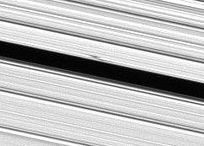Moonlet
Appearance





A moonlet, minor moon, minor natural satellite, or minor satellite is a particularly small natural satellite orbiting a planet, dwarf planet, or other minor planet.
Up until 1995, moonlets were only hypothetical components of Saturn's F-ring structure, but in that year, the Earth passed through Saturn's ring plane. The Hubble Space Telescope and the European Southern Observatory both captured objects orbiting close or near the F-ring. In 2004, Cassini caught an object 4–5 kilometers in diameter on the outer ring of the F-ring and then 5 hours later on the inner F-ring, showing that the object had orbited.[1]
Several different types of small moons have been called moonlets:
- A belt of objects embedded in a planetary ring, especially around Saturn, such as those in the A Ring, S/2009 S 1 in the B Ring ("propeller" moonlets),[2][3] and those in the F Ring[4]
- Occasionally asteroid moons, such as those of 87 Sylvia[5]
- Flashes seen near Jupiter's moon Amalthea that is likely debris ejected from its surface[6]
- Subsatellites[7]
See also
[edit]Look up moonlet in Wiktionary, the free dictionary.
References
[edit]- ^ Winter, Othon C.; et al. (2007). "Moonlets wandering on a leash-ring". Monthly Notices of the Royal Astronomical Society: Letters. 380 (1): L54 – L57. Bibcode:2007MNRAS.380L..54W. doi:10.1111/j.1745-3933.2007.00347.x. hdl:11449/33832.
- ^ Tiscareno, Matthew S.; et al. (2006). "100-metre-diameter moonlets in Saturn's A ring from observations of 'propeller' structures". Nature. 440 (7084): 648–650. Bibcode:2006Natur.440..648T. doi:10.1038/nature04581. PMID 16572165. S2CID 9688977.
- ^ Sremčević, Miodrag; et al. (2007). "A belt of moonlets in Saturn's A ring". Nature. 449 (7165): 1019–1021. Bibcode:2007Natur.449.1019S. doi:10.1038/nature06224. PMID 17960236. S2CID 4330204.
- ^ Murray, Carl D.; et al. (June 5, 2008). "The determination of the structure of Saturn's F ring by nearby moonlets" (PDF). Nature. 453 (7196). The Science and Technology Facilities Council: 739–44. Bibcode:2008Natur.453..739M. doi:10.1038/nature06999. PMID 18528389. S2CID 205213483.
- ^ Marchis, Franck; et al. (2005). "Discovery of the triple asteroidal system 87 Sylvia". Nature. 436 (7052): 822–24. Bibcode:2005Natur.436..822M. doi:10.1038/nature04018. PMID 16094362. S2CID 4412813.
- ^ Fieseler P. D.; Adams O. W.; Vandermey N.; Theilig E. E.; Schimmels K. A.; Lewis G. D.; Ardalan S. M.; Alexander C. J. (2004). "The Galileo star scanner observations at Amalthea". Icarus. 169 (2): 390–401. Bibcode:2004Icar..169..390F. doi:10.1016/j.icarus.2004.01.012.
- ^ Walker, Robert (17 April 2015). "Can Moons Have Moonlets? Or Rings? Moonlets Of Pluto's Moons?". Science 2.0. Retrieved 9 April 2016.
